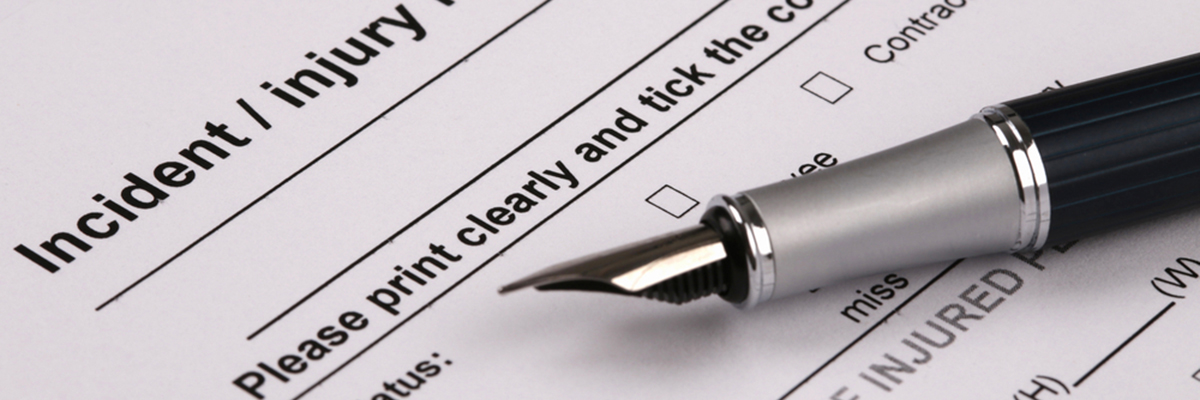Reporting incidents, accidents, assaults and near misses
All incidents, accidents, assaults and near misses involving employees should be reported in a book or file kept specifically for the purpose.
The record should give full details of what happened and any action taken. Dangerous incidents, including violence, whether actual or threatened, should also be recorded. Employers may issue their own ‘incident’ report forms for this purpose.
Regulations governing the reporting of serious accidents
The Reporting of Injuries, Diseases and Dangerous Occurrences Regulations 2013, known as RIDDOR, govern the reporting of serious accidents.
The Regulations provide for certain accidents to be reported to the Health and Safety Executive (HSE) and to support the performance of accident and ill-health prevention activities.
The RIDDOR Regulations apply to events, deaths or injuries resulting from accidents, instances of disease and dangerous occurrences that arise out of, or in connection with, work activities covered by the Health and Safety at Work Act 1974.
Who the Regulations cover
All employees, self-employed people working on the premises and people receiving training for employment are covered by RIDDOR.
Any accident resulting in a fatal or major injury must be reported by telephone to the HSE immediately. The details must be confirmed on Form F2508/F2508A within ten days.
If the accident does not result in a fatal or major injury but the employee is incapacitated from normal work for more than seven working days (excluding the day of the accident), there is no need to telephone the HSE, but the appropriate form must be completed and sent to the HSE within 15 days of the day of the accident.
Employers are required to keep a record of any reportable death, injury, occupational disease or dangerous occurrence and all occupational accidents and injuries that result in a worker being incapacitated or away from work for more than three consecutive days (not counting the day of the incident, but including weekends).
Pupils and any visitor not at work
If a pupil or visitor is killed or is taken to hospital as a result of an accident arising out of or in connection with work, the incident must be reported as with employees.
Evidence of a connection with work could be an accident attributable to the condition of the premises, plant or equipment on the premises, or lack of proper supervision.
The responsibility for making RIDDOR reports
The responsible person may be the employer or person in control of the premises where work is carried out. All RIDDOR incidents must be recorded and the information kept for at least three years.
Definitions
Specified injuries are defined in the regulations as:
-
fractures, other than to fingers, thumbs and toes;
-
any injury likely to lead to permanent loss of sight or reduction in sight;
-
amputations;
-
any crush injury to the head or torso causing damage to the brain or internal organs;
-
serious burns (including scalding) which:
-
covers more than 10% of the body;
-
causes significant damage to the eyes, respiratory system or other vital organs;
-
-
any scalping requiring hospital treatment;
-
any loss of consciousness caused by head injury or asphyxia;
-
any other injury arising from working in an enclosed space which:
-
leads to hypothermia or heat-induced illness;
-
requires resuscitation or admittance to hospital for more than 24 hours.
-
Dangerous occurrences include collapse of building, explosion or fire causing suspension of work for over 24 hours; release of flammable liquid, gas or any substance which may damage health.
Reportable diseases include any disease attributed to occupational exposure to a biological agent, as well as conditions such as carpal tunnel syndrome.
If there is doubt, a check can be made with the HSE.
Action the casualty should take
The person injured should, with assistance if necessary:
-
ensure that an entry is made in the accident book, which records the names of any witnesses, and copy this to the NASUWT Representative;
-
check that the RIDDOR report described above has been completed;
-
seek medical advice if necessary;
-
submit a BI95 form to the local Benefits/Social Security/Jobcentre Plus office to ensure that it is recorded as a workplace injury. The simplest way is to contact the Incident Contact Centre. This can be done by telephoning 0345 300 9923 (Mon-Fri 8.30am-5pm) and completing and submitting the appropriate form;
-
seek advice from the NASUWT Representative.
If the accident may have been caused by the action or negligence of a third party, contact should be made with NASUWT.
Where a member suffers any injury, the injured member should telephone the NASUWT’s free Legal Advice Line: 0808 100 2221.
The NASUWT Health and Safety Representative has the right to conduct his/her own investigation and to collect photographs, sketch plans and take measurements, witness statements and similar evidence.
Advice and support
For advice and support, contact your NASUWT Local Association or National/Regional Centre.

